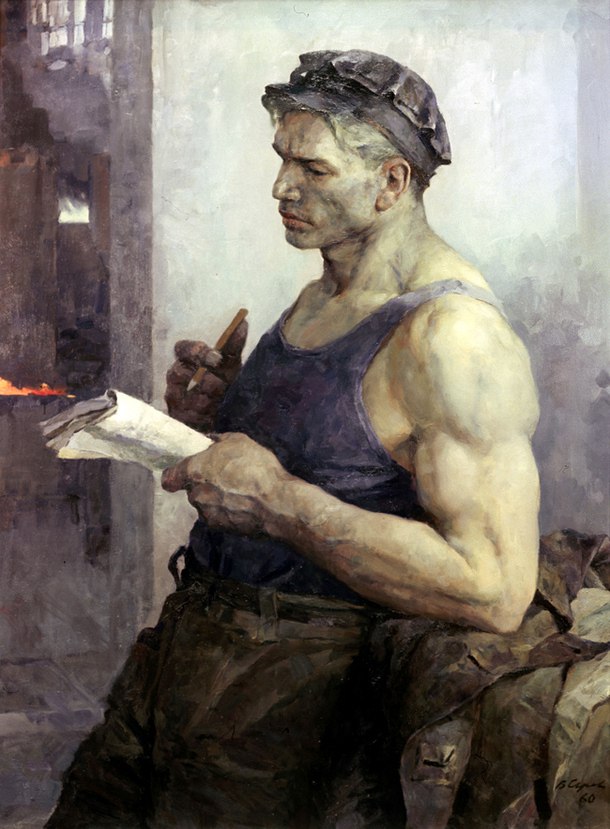I would argue that it is the video streaming service that is the real means of production, rather than the camera and software.
Disagree. Streaming serivce is a place of exchange, not production. In the same manner you could consider lets’s say a city market mean of production - all those also had set of rules and take fees for allowing producers to sell their products.
Good point.
Content creators are akin to writers, they do not own the platforms where their content is published only their “brand”. (Writers sell their publishing rights to big publishers who take most of the profit off sells while authors get minimal royalties).
Also nowadays most income from content creators comes from crowdfunding services (which they also do not own) like patreon. They are a “crowdfunded” class.
I think the internet might necessitate new class analysis.
They own a camera and editing software, but they’d have absolutely no way to distribute their craft without Youtube. That makes them almost like contract workers or gig workers - forced to buy their own means of production to produce value and sell their labor to an algorithm.
Is an Uber driver petite bourgeoisie? I think not, it’d be absurd to put them in the same class as a small business owner or petty landlord.
This is a take I have to say I agree with. If YouTube decided to delete a channel of a content creator, for most creators, that would be the end.
The “gig economy” and “independent contract work” like Uber largely exists to take the tax burden off of employers and to gaslight laborers into the mindset that they are actually “entrepeneurs.”
Well it also takes the burden of training off of employers, the burden of providing tools off of employers, the burden of unemployment insurance off of employers, and the burden of most labor laws off of employers. It’s a great deal!
I think you are confusing the way a product is sold with how a product is created. Content creators are basically just loosely affiliated subcontractors. And just like with subcontracting you have a range of a single person making videos on the side to dozens of people employed to work on a channel. So being a content creator doesn’t determine your class.
There was this one ‘free speech’ youtuber/podcaster in my country who claimed he was a bourgeois because he owned the camera, the editor tools and the place where he filmed. He then proceeded to defend the creation of a nazi party and shared content doubting the integrity of the elections. He was demonetized and then banned from all social media, his videos were deleted and he fell into obscurity. It was only then that he learned that he did not own the means of production.
Likewise, I own an assortment of tools to perform my job. Yet, I do not own the MOP.
no, unless they exploit the labour of another person to produce their content, they’re neither bourgeois nor petit bourgeois; they’re not necessarily proletarian either (perhaps they could be considered artisans), but they are workers
deleted by creator
I would say no; it’s only indirect exploitation, and everyone living in a capitalist country does this more or less willingly to survive. It’d be different if the creator had an ownership stake in the video platform, had employees, etc.
In that case, did JKR become a billionaire by being a worker?
JK Rowling? Did she make that money from sales of the books she wrote, with no stake (e.g. a significant percentage of stocks) in the various organizations that sold HP merchandise, movies, games, etc.?
She owns the media rights, so the answer would be both.
JKR is not a valid example of a worker as their money comes mainly not from the fruits of their labour, but the amalgamation of entire industries that help her reap billions.
But why does that line of reasoning not apply to rich YouTubers and Twitch streamers?
If influencers stopped working, their revenue would go down drastically, which can’t be said of Rowling. So in a sense they have to work for a living, but they’re also so rich that they could stop working if they wanted to. It just seems like they’re similar situations.
If you can call an athlete or a movie star labour aristocrats, it seems like that label would also apply to successful authors and influencers. They’re all propped up by the industries built around them.
Good point. A rough estimate would be she gets 10% of each of the 600,000,000 $15 Harry Potter books that have been sold worldwide. That comes out to $900,000,000.
A lot of that value came from the many workers involved in the publishing, marketing, translating, printing, shipping, etc. of the books. Did she get the surplus value of their labour? Does intellectual property count as means of production? How is that different from Youtubers and Twitch streamers benefitting from the labour put into their respective platforms?
If intellectual property is valid in at least some sense and she deserves monetary compensation for the sale of Italian translations, why does that not transfer to the licensing for movies and theme parks?
Btw I’m neither defending Rowling nor am I being antagonistic / trying to pull a gotcha or anything. I just think it’s interesting.
(This is just my interpretation of the proletariat as a class and intellectual property, so take it with a grain of salt.) It’s worth noting that in the post title’s case, the labour embodied in YouTube as a platform and the advertisements shown by YouTube would have existed without the video creator in question. In Rowling’s case, the vast majority of her wealth comes from her ownership of the IP, which is then “leased” by the corporations that produce the content in question (books, movies, plays, games, theme parks, merchandise, etc.), meaning that the source of her money is effectively rent. Since the IP isn’t something tangible like a housing complex, I’m not sure if people like her are clearly bourgeois like landlords, but she’s certainly not surviving by selling her labour power (so she’s not proletarian) and she’s not surviving by selling goods she created (so she’s not an artisan)
YouTubers profit of US, the viewers. We buy their overpriced merchandise, we religiously watch their ads and their sponsorships. Heck some people even go further and crowdfund them through patreon!
They’re not bourgeoisie (tho their lifestyles are as opulent), they’re merely jesters of our time, they have huge incomes because WE crowdfund them in exchange for entertainment.
The platform, the ad companies, patreon shareholders are the capitalists. They take a cut from every content creator income.
deleted by creator

Did we read the same book!?
https://www.marxists.org/archive/marx/works/1864/economic/ch02b.htm
"That worker is productive who performs productive labour, and that labour is productive which directly creates surplus value, i.e. valorises capital.
…
Only the narrow-minded bourgeois, who regards the capitalist form of production as its absolute form, hence as the sole natural form of production, can confuse the question of what are productive labour and productive workers from the standpoint of capital with the question of what productive labour is in general, and can therefore be satisfied with the tautological answer that all that labour is productive which produces, which results in a product, or any kind of use value, which has any result at all.
…
Every productive worker is a wage labourer; but this does not mean that every wage labourer is a productive worker. In all cases where labour is bought in order to be consumed as use value, as a service, and not in order to replace the value of the variable capital as a living factor and to be incorporated into the capitalist production process, this labour is not productive labour, and the wage labourer is not a productive worker. His labour is then consumed on account of its use value, not as positing exchange value, it is consumed unproductively, not productively. The capitalist therefore does not confront labour as a capitalist, as the representative of capital. He exchanges his money for labour as income, not as capital. The consumption of the labour does not constitute M-C-M’, but C-M-C (the last symbol represents the labour, or the service itself). Money functions here only as means of circulation, not as capital.
… This phenomenon, that with the development of capitalist production all services are converted into wage labour, and all those who perform these services are converted into wage labourers hence that they have this characteristic in common with productive workers, gives even more grounds for confusing the two in that it is a phenomenon which characterises, and is created by, capitalist production itself. On the other hand, it gives the apologists [of capitalism] an opportunity to convert the productive worker, because he is a wage labourer, into a worker who merely exchanges his services (i.e. his labour as a use value) for money. This makes it easy to pass over in silence the differentia specifica of this “productive worker”, and of capitalist production — as the production of surplus value, as the process of the self-valorisation of capital, which incorporates living labour as merely its AGENCY. A soldier is a wage labourer, a mercenary, but he is not for that reason a productive worker."
Maybe they’re labour aristocrat or bourgeois proletariat rather than petite bourgeois? But this would likely depend on income. They’d have to earn enough ‘to live on’ for that. I don’t know what that figure would be. People like Mr Beast probably have whole teams working for them. In that case, they’re likely petite bourgeois because they use their capital (which includes IP) to employ others and exploit their labour.
Income is a different variable, a different kind of classification. YouTubers’ relation to how they make their income is basically always proletariat or petite bourgeoisie.
Whether they are “aristocratic” because of their income levels is another dimension or classification, one that intersects with the relationship to the means of production, but does not sit side by side with it. This is hinted at in your description “labour aristocrat” - it is a compound class, the combination of labour (working class) and wealthy (income class).
Unclear. I would say yes, in the very same manner that a petty craftsman or peasant would be, and note how the professional youtubers are oozing petty bourgeois sentiment.
The one thing I wonder about these kinds of questions is how you’re planning to judge them based on the answer. It always seems very discourse-focused and semantic to have debates like this when the rules/relations that determine class are mostly well-documented.
So let’s say Youtubers are petit-bourgeois, as a whole. Does that just mean you’ll throw more snark at them? Or will it actually help Youtubers better understand their role in the system?
Maybe to go about this in a more scientific manner, it would be useful to have examples or case studies which we can use to differentiate and focus our attention. I’m presuming we can’t know the intimate details of content creators of different types, and so we can make some assumptions and see how they hold up to scrutiny.
Something to note, as opposed to something like Marcus Aurelius’ Meditations which I read was considered by historians to be something private and not explicitly made for publication and therefore presumptuously less inauthentic compared to a contemporary account (where it might be thought to be necessary to exaggerate, show oneself in a positive light, lie by omission, etc.) the kind of information available is sorta contentious as it in itself could be used as a way to sort of market oneself.
For like categories, one obvious one would be where a content creator runs a large business with millions in revenue and no longer needs to work to maintain their quality of life, I’m thinking of Linus Tech Tips. Another would be smaller video essay makers with specialized training, someone like Super Bunnyhop, ContraPoints, or Folding Ideas. They all have some relevant experience or education which makes their work maybe exist at a lower barrier of entry. Contrast this with someone like Noah Caldwell-Gervais who as far as I know does it have any relevant education or experience.
How could each of these individuals or groups be analyzed, with what assumptions, and then assigned to being a proletarian, petty bourgeoise, labour aristocrat, etc.?
I actually don’t know mostly because I don’t know that much about the distinctions, I don’t know much ML theory, so if any comrades could share their insights (with whatever examples they choose) it would really help my understanding and learning!
EDIT: Maybe it’s worth ignoring folks who might have a special status in our community, like people who are broadly aligned with our aims (like Hasan) or are particularly unsavoury (V***h) to have a less charged analysis.
The camera and editing software are a negligible part of the means of production, you can get the former for cheap and the latter for free. The video being distributed, watched, liked, generating profit, and making a cut for the creator foremost depends on the vast digital infrastructure, on the data centres and software that Youtube, and only it, commands. This creates clear leverage of Youtube over the creator, which can be used to threaten and punish them in various ways. Youtubers are functionally employees or subcontractors of Youtube, and therefore proletarian.
The way I see it, not necessarily.
The same way an Uber driver owns a car, a content creator owns a camera and a computer, but both are still subjected to the will of the corporation that owns the platform they use to make a living. If youtube decides to demonetize or strike a video, that person’s income is directly effected and can even be at risk of losing their channel.
The vast majority of content creators just do it because they enjoy it and doesn’t get paid enough, if at all, to make a living out of it. And even when they do get enough, there is no safety nets for them. What if a video doesn’t get views? What if youtube is not promoting them? What if it gets age restricted? What if it gets demonetized? What if their camera breaks? What if the computer breaks? What if they get sick?
To me this looks like a really precarized work. Sure you’re free to make the content that you want at the pace you want at first, but the moment it turns into a job that pays your bills you’re gonna have to play by the rules of what makes money to maximize your chance of actually getting paid enough to continue doing it. This includes suspicious sponsorships, clickbaity titles and thumbnails, constantly uploading content, etc.
Of course there are really big content creators that earn a lot of money, specially through sponsorships, and that have writers, editors, etc, working for them. In this case yeah I think they would be a part of the petit-bourgeoisie.
The more pertinent part of being petite bourg is extracting labor value from others. Owning the MOP is important for enabling you to do that.
So yes, if they have an editor or script writer or whatever.












